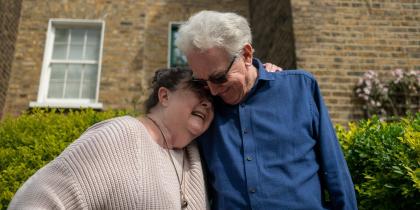Rethinking Sexual Consent: Intimacy and Agency in Dementia Care
Staff training can help senior care facilities balance patients’ safety with their right to sexual wellness.

Imagine a situation where a staff member at a senior care facility finds a male patient, Bob, and a female patient, Jane, sitting together in Bob’s room. Both of them are in their 80s and have been diagnosed with dementia — and Jane has taken off her clothing.
Can Bob and Jane consent to a sexual situation? If your immediate thought is “no,” take a second to pause and rethink that assumption! The question of whether older adults with dementia can consent to intimacy is a complex and nuanced one that can’t be answered with an all-encompassing “yes” or “no.”
Every person has their own unique set of circumstances that factor into whether they’re able to provide consent. While it’s crucial to protect older adults who may be vulnerable to and unable to report sexual abuse, it’s also important to protect their right to engage in sexual activity that enhances their quality of life as long as they are able to provide consent.
While Bob and Jane’s situation is hypothetical, frontline health care staff at senior care facilities face very real situations like this every day at work. If those staff members aren’t educated on how to respond in those moments, they may react overly restrictively, shutting down sexual activity to try to protect the patients from potential harm — even if no one is being harmed.
By educating staff on the complexities around sexual consent in older adults with cognitive decline, plus emphasizing a person-centered approach on how to respond when these situations occur, senior care facilities can maintain their patients’ rights to sexual well-being and autonomy while protecting them from unsafe situations.
Ageism stands in the way of older adults’ right to intimacy
When people make ageist assumptions, it can deprive older adults of their right to sexual health and wellness. Despite the proven benefits of a sexually active life, such as pain reduction, mood elevation, cardiac health, and improved relationships, society has many myths about sexuality in older people.
These ageist myths cause people to wrongfully label older adults as asexual and sideline them. That happens even more to older adults who are frail or cognitively limited. It’s time we confront these misconceptions and recognize the importance of holistic well-being for all, regardless of age.
At Hebrew SeniorLife, we are taking proactive steps at Hebrew Rehabilitation Center, our long-term chronic care hospital, to address complex situations involving patient interactions, especially around sexual and intimate expression. Knowing just how intricate these matters are, we formed a dedicated committee led by Staff Psychologist Rachael Arielly, PsyD.
The committee stems from staff members recognizing the need for additional guidance in this area, and it is supported by a robust body of research looking at the essential criteria for sexual and intimate decisions. This committee consists of a diverse team of professionals at Hebrew Rehabilitation Center, including chaplains, psychologists, social workers, and nurse educators, underlining a multi-disciplinary approach. They have also joined forces with external experts Nathalie Huitema, PhD, and Sarah Rogers, LICSW.
What determines whether someone with dementia can give consent?
The Hebrew Rehabilitation Center committee is establishing a framework based on the concept of sexual consent potential, a new approach that emphasizes what people with dementia are capable of over deficits and challenges. It shifts from measuring what a person can’t do to determining what they can do, what they value, and what is ethical and legal in a specific situation.
What factors go into determining a person’s ability to consent, or their sexual consent potential? The Delphi study on sexual consent selected a group of international research and health care professionals to come to an agreement on what factors determine a person with dementia’s sexual consent potential. These are the factors that made the list:
- They are alert enough to make contact with others.
- They can communicate either verbally or nonverbally.
- They can express agreement or disagreement, either verbally, nonverbally, or through their behavior.
- They can respond to the verbal, non-verbal, or behavioral communication made by their sexual partner.
- The sexual act is voluntary.
- They are capable of deciding whether to be intimate.
- They can start and stop sexual activity.
- They have the ability to express enjoyment or pleasure.
- They can choose a socially acceptable time and place for sexual behavior or are willing to be directed to a socially acceptable time and place.
- There is no sign of abuse or harm within the relationship.
There were also two factors on the list related to the social and external environment in which a person lives, highlighting the importance of a supportive environment that fosters safe sexual encounters for patients:
- Medication and medical conditions should be taken into consideration.
- Facilities need to facilitate sexual expression through policy and staff training.
Everyone benefits when direct care staff are trained in patient intimacy
A goal of the recently formed committee is to brainstorm, develop, and propose strategies that help staff on the nursing floors effectively and sensitively handle situations of patient intimacy. The role of direct care staff is crucial, and so is training them to work in these complex situations. Direct care staff are on the front lines as caregivers, and they are the ones who navigate sexual and intimate situations directly in consultation with their teams.
By equipping staff with the knowledge and skills to navigate these situations, institutions can ensure a safer and more understanding environment for their patients, while reducing anxiety around how to handle the situation for staff members.
Actions speak louder than words
In sexual and intimate situations among patients, staff are often left wondering how to interpret behaviors. When working with patients, especially those who might not have the capacity to communicate their desires or discomforts verbally, their actions often speak louder than words. An observant staff member who is familiar with someone can decipher a lot from their non-verbal cues. Whether it’s an aversion to bathing, a particular food preference, or any other daily activity, there may be telltale signs that they either consent to or reject a specific action.
Staff members need training and support to accurately interpret and safely respond to these behaviors. Implementing new methods requires vigilance to detect any negative behavioral changes, which can tell staff whether an approach is beneficial or distressing. The entire team plays a role in ensuring the well-being of the patient, requiring a proactive, observant, and empathetic approach, especially when traditional communication may not be possible.
Those observational cues often extend to more intimate behaviors. For example, if a patient recently began associating with another patient and their behavior suddenly changes — maybe they become more withdrawn or display signs of distress — it’s essential for staff to consider the cause. Is the change in behavior related to their new association? By observing patterns and future changes in behavior, the staff can narrow down potential causes and help inform a care plan to either support or limit behavior.
The value of a mission-driven approach
At Hebrew SeniorLife, we aim to go past generic assumptions about individuals' decision-making abilities. Just because someone has a diagnosis such as dementia doesn’t mean they should immediately lose their right to make any decisions.
Instead, professionals can assess where the limitations lie and focus on individual needs rather than blanket restrictions. To assist with sexual and intimate decision-making capability, our committee aims to establish a set of guidelines that can serve as a roadmap for staff. These guidelines will help our staff when they encounter complex situations relating to patient intimacy, ensuring respectful and individualized care for patients.
The committee is currently developing a decision-tree model to help make these guidelines more tangible for staff at Hebrew Rehabilitation Center, making them translatable to real-world situations. For example, let’s reconsider the earlier example with Jane and Bob. As a staff member decides how to approach the sexual situation, the decision tree would prompt them to ask clarifying questions about safety, autonomy, well-being, and care. For example, are there current concerns about the safety of either patient (e.g., physical safety, medical safety, or emotional safety)? Are there any concerns that either party is unable to consent, either for cognitive or psychiatric reasons? Is the act being done in a private and appropriate space?
These questions serve to guide staff in a team decision-making process and relieve anxiety from the frontline staff, ensuring that all major issues are covered in a timely manner. In the scenario of Jane and Bob, let’s say that the team finds that each participant is physically, emotionally, and medically safe and that they are both consenting to this type of intimacy. That would mean that they can be supported to continue their intimate activity, the care plan will be documented, and a regular re-assessment will be conducted to ensure risks and concerns still remain minimal.
Unlike the straightforward parameters of supporting an individual’s identity, such as honoring their religious traditions, sexuality offers myriad shades of gray. Moreover, in settings like skilled nursing facilities or long-term chronic care hospitals, the decision-making process needs to be simplified and adaptable so that medical professionals, social workers, and nursing staff can collaboratively engage in this process.
The goal of the committee is to support a user-friendly, team-based process that considers each unique situation and assesses an individual’s potential. The focus is on understanding the individual’s needs and limits and, from there, determining how to support and safeguard their decisions in the realm of intimacy.
Hebrew SeniorLife honors your right to make choices
At Hebrew SeniorLife, we strive to honor the preferences, wishes, and choices of residents and patients across all of our locations.
If you’re seeking long-term chronic care at an organization that prioritizes treating every person with the individual respect, autonomy, and care they deserve, you’ve found the right place in Hebrew Rehabilitation Center in Boston and Dedham, MA. Contact us online today or call us at 617-363-8000 to learn more.
Rachael Arielly, PsyD, also contributed to this blog post.
Blog Topics
Learn More
Free Guide to Brain Health
Download our free guide, “Optimizing Your Brain Health,” for expert advice on boosting brain health at any age. Explore practical tips and resources from Hebrew SeniorLife’s Deanna and Sidney Wolk Center for Memory Health.

Hebrew Rehabilitation Center
Hebrew Rehabilitation Center provides skilled care and support after illness or surgery and offers long-term chronic care and specialized care for those with memory loss.

Long-Term Chronic Care
Hebrew Rehabilitation Center provides person-centered extended medical care in a homelike setting for patients with chronic illness. As a licensed long-term chronic care hospital, we provide higher-level, more comprehensive medical care to older adults than a traditional nursing home.





